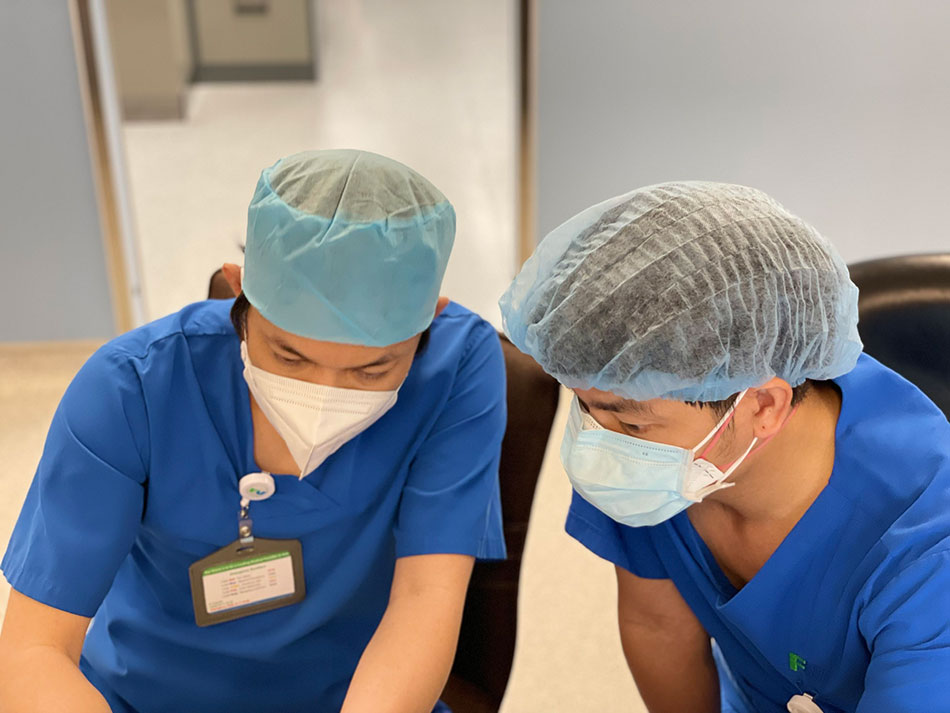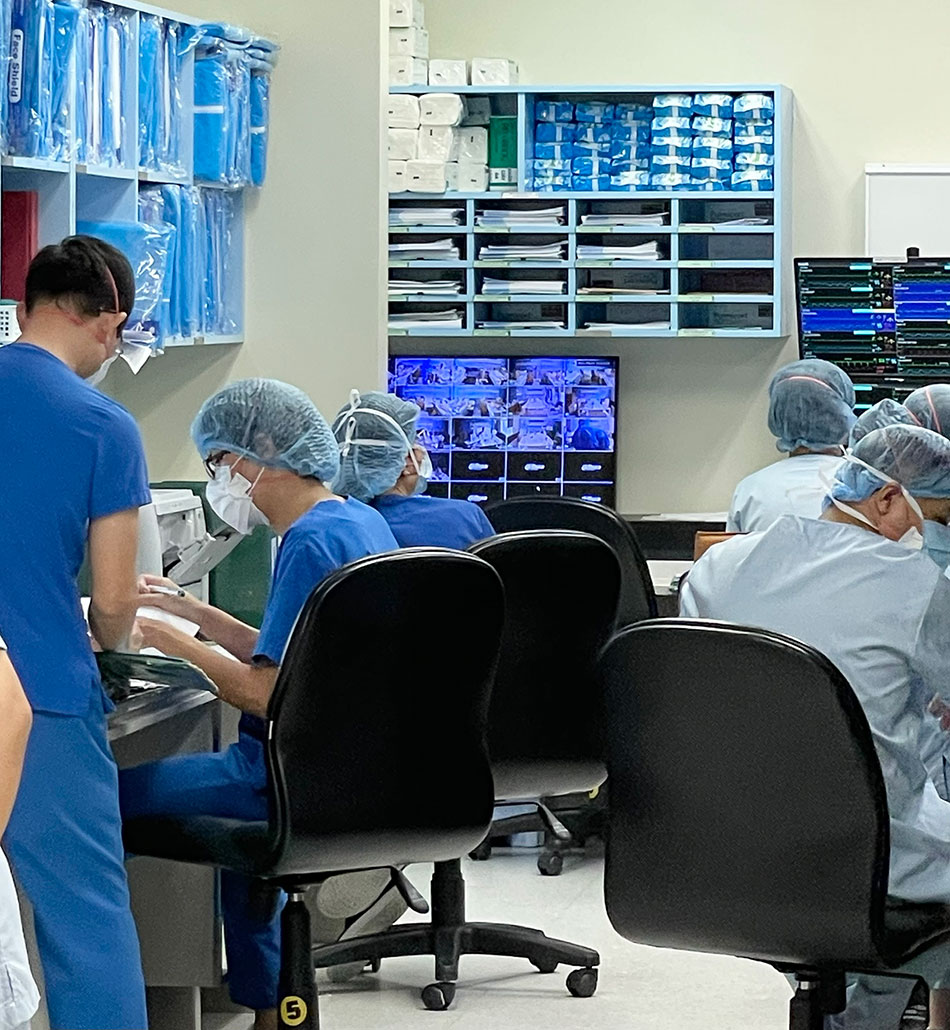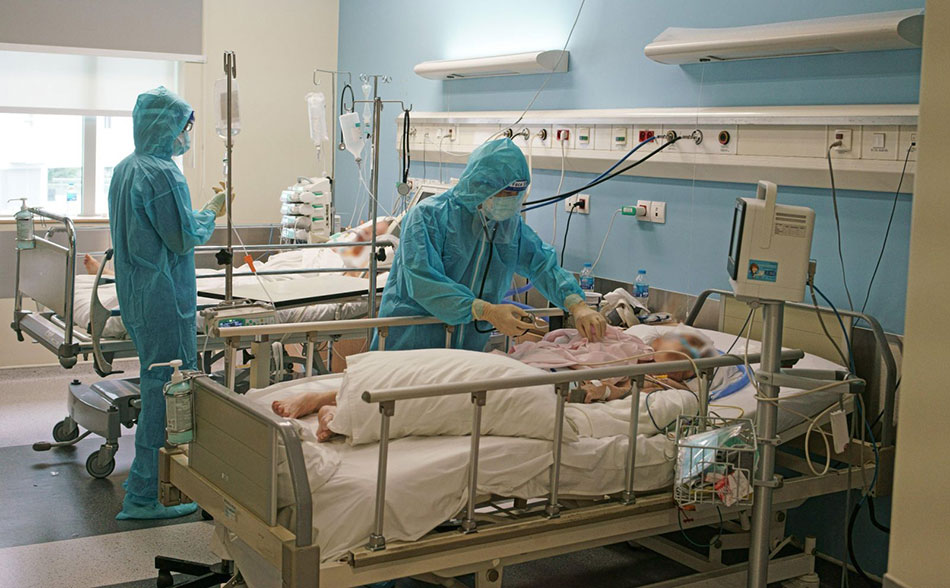Since FV started admitting F0 patients, mid-July, the COVID-19 Department has been a battleground for the medical staff working there. There’s a manpower shortage and the constant psychological burden of having to face life and death situations. But no matter what happens today, the sun will rise again tomorrow, and the dedicated team working here will continue to fight, without knowing when the battle will end.
Encouraging patients to keep fighting
The East & West Medical Ward on the 4th Floor is now part of COVID-19 Department treatment for F0 patients. At 8.00 a.m., Dr Ho Minh Tuan, began a briefing in the lobby of East Medical Ward, now became the department meeting place for F0 treatment issues at FV hospital. At the end of July, Dr Tuan who manages the Cardiology Department volunteered to assumed concurrent responsibilities as the Head of the hospital’s COVID-19 Department. Doctors, many of whom have not finished last night’s shift, are in a hurry to find seats to announce the status of treatment during the night and discuss new proposals and guidelines.

The briefings at this new ward are tense at times; at others, they’re filled with laughter. Dr Tuan shared that in addition to being healthy and being able to contribute expertise, it’s necessary to create a positive atmosphere and optimistic spirit at work. It’s hard to continue working amid ongoing uncertainty due to the pandemic if you can’t find joy and hope. Dr Nguyen Thi Nghia, from FV’s Department of Gastroenterology and Hepatology, smiles and says: “I am almost 60 years old, but I feel that I can still help many patients here, so I decided to join this treatment team.” Willingness, commitment and daring from doctors are the foundations of FV’s COVID-19 Department.
Behind the “meeting room”, nurses are still busy preparing everything for a morning treatment round, including protective gear, medicine for each patient and the necessary tools. Everything is checked very carefully as once staff have entered the treatment area, it is necessary to complete all the tasks set out before returning to a clean room at noon. Among the people gathered are some new nurses, who perhaps were just added to the treatment team. Ms Chu Thi Nguyet Anh, Head Nurse of Medical West Ward, smiles and says: “Even the senior nurses here are now considered newcomers. Everything is new, so everyone has to stay up to date, do the work and learn from the reality.” But this whole month, the Inpatient COVID-19 Department has seemed separate from reality, where everything is spinning. Someone who has only been apprenticed for two or three days quickly has to face the very harsh conditions on the other side of the treatment room door.

The area on the fourth floor of F building, which used to be the Medical Ward, is now very different, with the space divided to create clean areas, buffer zones and treatment areas to increase safety for the staff working here. To enter, members from other department need a guide. This morning, the West Medical nursing room had a slightly more comfortable atmosphere, including sighs of relief, laughter and words of encouragement. People say it’s been a long time since the shift was released on time, as it was today. Normally, each night shift is ended and handed over at 8 a.m., but recently handover has been extended to 9 o’clock or so. Everyone in the COVID-19 Department feels that time is becoming more precious by the day. Medical staff are not only spending time with F0 patients, helping them to fight the virus, but also taking time to breathe, to calm themselves and return to the daily battle.
Facing overload
Unlike the spirit of the first meeting of the day, the working atmosphere is somewhat heavy and stressful. Everyone is completely occupied by their work. You rarely hear anyone say anything. Staff covered in protective equipment pass along corridors in the treatment area and there is no time to rest. Medicines and items that were used only a few times a month before now have to be imported and used in bulk every day.
In around 10 minutes, the emergency bell of patient pulled by a patient calling for assistance in the clean area rings no fewer than five times. According to the coordination of Ms. Nguyet Anh, the nurses to investigate the situation in room 419. Before they could catch their breath, they have to run out and report to another room. The same thing happens every day. Sometimes the ward has 14 or 15 cases requiring mechanical ventilation in the same night, and everyone feels exhausted. “Everyone is completely overloaded,” Nguyet Anh says, while busily adjusting the patient data on the ward’s information board with no single empty space.
Half of the board details patients with moderate symptoms; the other, those in the intensive care or who need continuous breathing support. On a normal day, there will be a few empty rooms left in the hospital suite for a patient to lie down temporarily while they wait for their room to be cleaned, or to be moved to another treatment room. Now there is only time to transfer patients simultaneously along this corridor: one patient leaves, another enters immediately. A case being transferred from the West Medical wards (which treat severe illness) to the East Medical wards (where minor illness is treated and patients await discharge) was cause for a sigh of relief. But many people have stayed in the West Medical wards for a long time, and there are people who will never be discharged anywhere. Suddenly one day, this area became the place where many separations take place, with countless different thoughts and emotions. There is a huge psychological burden for the many staff who work here.

Yet everyone is still here, still diligently checking every inch of the clean area, still wearing personal protective equipment as they run along the corridors of the treatment area, still managing to encourage patients every day. Nguyet Anh shared: “Who is not afraid? All of staff here are fearful. But the fear of illness is sometimes not as great as worrying about overlooking something or making a mistake that then causes problems for the patient.” In these days, often what prevents the feet and hands of the staff from tiring is not courage, or their fighting spirit. It is simply the fear of thinking that they have not tried hard enough for the patient, or not fulfilled their responsibilities. The heart of the medical profession does not allow them to give up.
Outside the common corridor between the East and West Medical wards, I observed Dr Tuan is breathing heavily after a busy morning visiting patients. However, when he approaches, he still smiles and says: “It’s okay, I’m a bit tired, but this feeling can be solved. In a few days, more people will come to help.” During this time, everybody working at the COVID-19 Department needs human tenacity, optimism and hope. But even if those things gradually ebb away, every member of the team knows that tomorrow will still come to the COVID-19 Department, and they will still continue to do everything in their power to save the lives of their patients.



